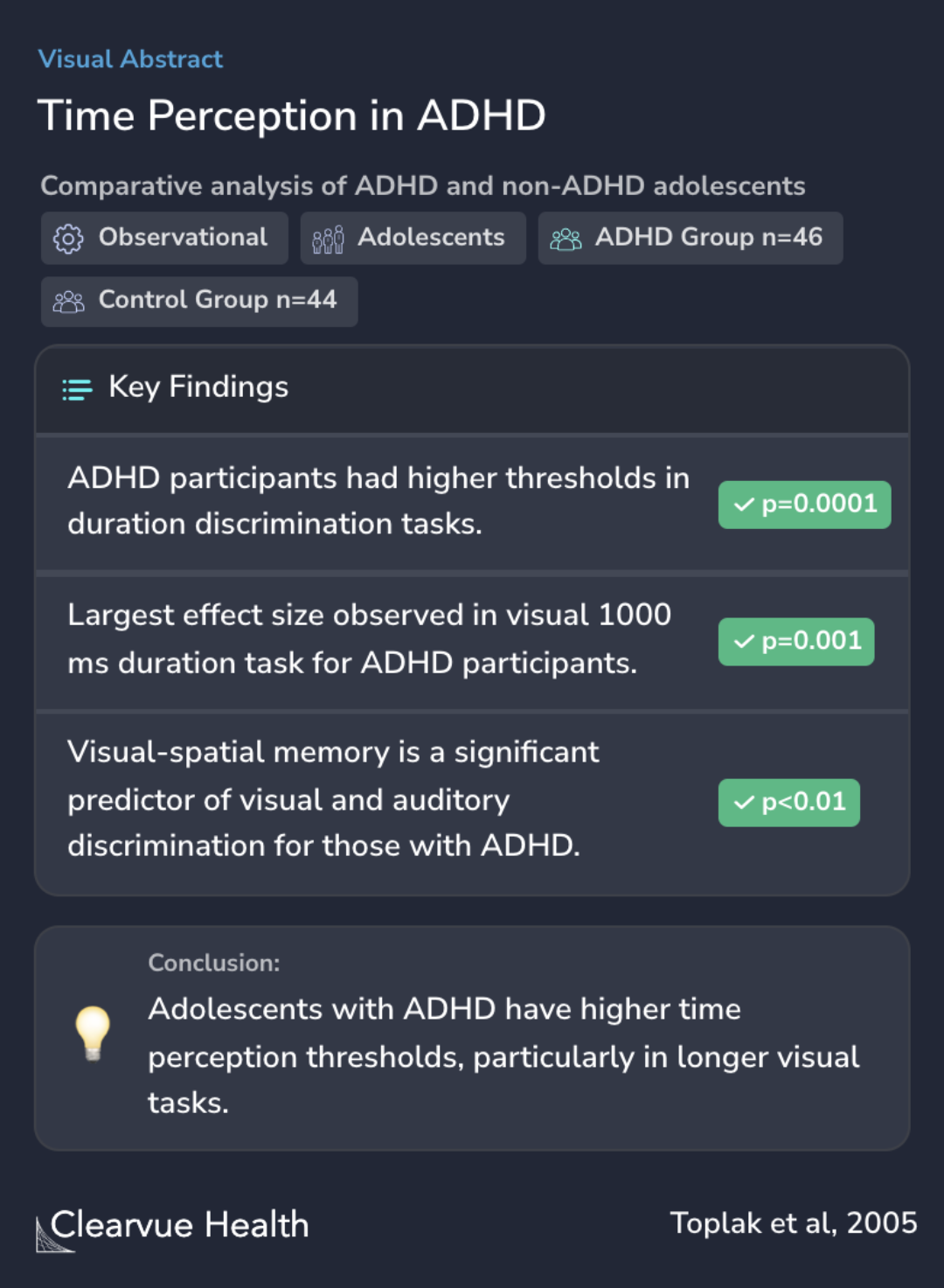Time perception: modality and duration effects in attention-deficit/hyperactivity disorder (ADHD)
Time Perception in ADHD
Maggie E Toplak, Rosemary Tannock

Objectives
The study systematically examined time perception performance in adolescents, focusing on those with and without attention-deficit/hyperactivity disorder (ADHD). It aimed to understand how changing the modality (auditory and visual) and duration length (200 and 1000 milliseconds) impacted their time perception abilities.
Time perception performance was systematically investigated in adolescents with and without attention-deficit/hyperactivity disorder (ADHD). Specifically, the effects of manipulating modality (auditory and visual) and length of duration (200 and 1000 ms) were examined.
Methods
The research involved forty-six adolescents with ADHD and forty-four without the disorder. They underwent four duration discrimination tasks and two control tasks. Various standardized measures were also administered.
Forty-six adolescents with ADHD and 44 controls were administered four duration discrimination tasks and two control tasks, and a set of standardized measures.
Results
In the study, it was found that individuals with ADHD exhibited higher thresholds across various duration discrimination tasks compared to the control group. This gap in performance was especially pronounced in tasks involving visual duration discrimination at 1000 milliseconds.
These findings suggest that visual-spatial memory plays a crucial role in the ability of those with ADHD to discriminate duration in both visual and auditory tasks, particularly at longer intervals like 1000 milliseconds. On the other hand, in the control group, it was auditory verbal working memory that was more predictive of success in auditory discrimination tasks at these longer intervals.
The study's results provide valuable insights into the cognitive processing differences in individuals with ADHD, highlighting specific areas where their sensory processing and memory handling differ from those without the condition.
Participants with ADHD had higher thresholds than controls on all of the duration discrimination tasks, with the largest effect size obtained on the visual 1000 ms duration discrimination task. No group differences were observed on the control tasks. Visual–spatial memory was found to be...
Conclusions
Participants with ADHD had higher thresholds than controls on all of the duration discrimination tasks, with the largest effect size obtained on the visual 1000 ms duration discrimination task. No group differences were observed on the control tasks. These group differences suggest impai...
Context
Studying ADHD in children helps us understand how they see and understand time. The research by Barkley et al. looked at how ADHD affects kids' ability to know and remember time intervals. They also checked if ADHD medicine helps with this. Their study found that kids with ADHD were not very good at this, especially when they were distracted. Even with medication, they did not get much better. This shows us that ADHD can make it hard for kids to understand time, and usual medicines might not help much.
Then, there is another study by Sjöwall et al. from 2013. This research talks about how ADHD affects not just how kids think, but also how they feel. Kids with ADHD had problems with reacting in time and managing their feelings.
So, when we look at the abstract we are talking about, it adds to our understanding of ADHD. Barkley et al.'s study focuses on how kids with ADHD understand time and if the medicine helps. But it's just one part of a bigger picture. Other studies, like the one by Sjöwall et al., show us that ADHD can affect kids in many ways. Together, these studies help us see a more complete picture of how ADHD affects children.